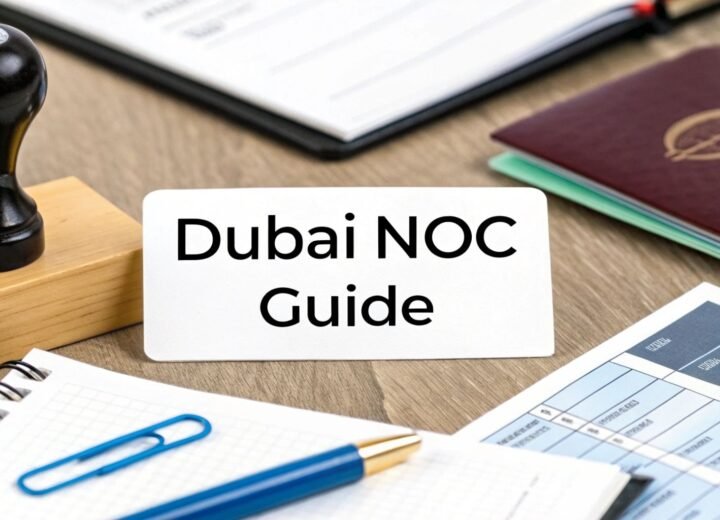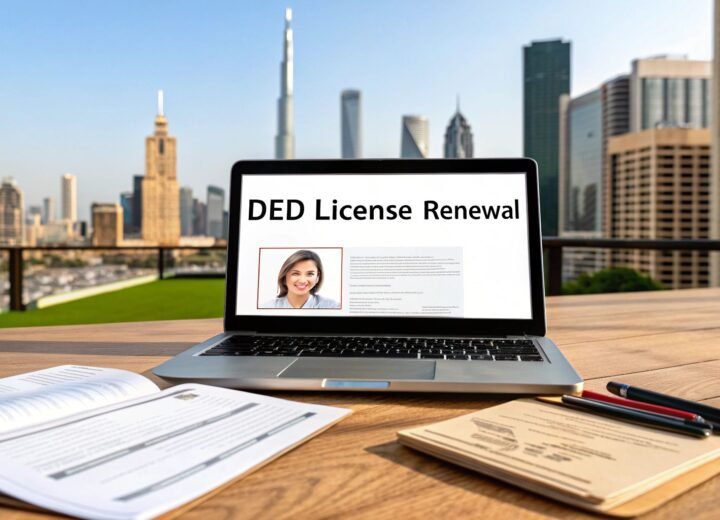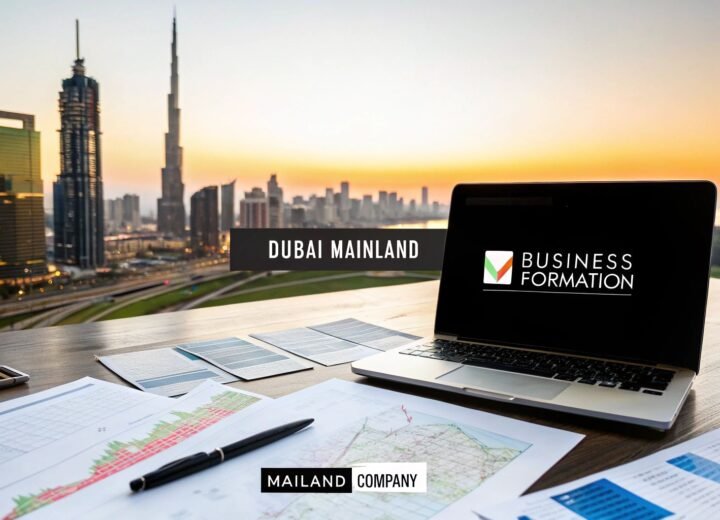Getting registered for corporate tax in the UAE is a must, and it's all handled through the Federal Tax Authority's (FTA) online portal, EmaraTax. The process involves setting up an account, plugging in your company’s details—like your trade licence and some financial info—and submitting the application.
The key thing to grasp right away is that registration is required for most businesses, even if you’re certain your profits will fall below the taxable threshold.
Your First Steps in UAE Corporate Tax Registration
Navigating the UAE's new corporate tax system is a critical task for every business, from bustling Mainland operations in Dubai to specialised Freezone companies across the Emirates. This regulation is a big shift, and understanding your obligations from the get-go is the best way to avoid penalties and ensure a smooth transition.
The good news? The system is designed to be highly competitive, especially for international entrepreneurs looking to enjoy the UAE's tax benefits. The structure is refreshingly straightforward: the tax rate is 0% on taxable profits up to AED 375,000 and a flat 9% on anything above that. This two-tiered approach gives startups and small businesses breathing room while bringing the UAE in line with global financial standards.
But here’s where a common misconception trips people up: thinking that a 0% tax bill means you don't need to register. That's not the case. Registration is mandatory for almost every business, creating a formal record with the Federal Tax Authority (FTA). Even freelancers and sole proprietors with an annual business income over AED 1 million must get on the FTA's radar.
Who Needs to Register?
The requirement to register for corporate tax is broad and covers a wide range of business structures. It’s not just for big corporations; small businesses, startups, and even certain individuals fall under this mandate.
Before you can even think about filing taxes, your business needs a solid legal foundation. For new entrepreneurs, this means ticking off preliminary steps like understanding how to register business names.
Here’s a quick rundown of who absolutely must complete the registration:
- Mainland Companies operating in Dubai, Abu Dhabi, or any other emirate.
- Freezone Companies, even though they might qualify for a 0% rate on certain income.
- Individuals (natural persons) who are conducting business activities with revenue over AED 1 million per year.
- Non-resident persons who have a permanent establishment in the UAE.
To make it even clearer, here's a quick summary table.
UAE Corporate Tax At a Glance: Key Registration Triggers
| Entity Type / Threshold | Registration Requirement | Key Consideration |
|---|---|---|
| Mainland Companies | Mandatory | All mainland LLCs and similar entities must register, regardless of income. |
| Freezone Companies | Mandatory | Registration is required, but you may qualify for a 0% rate on specific income streams. |
| Individuals (Business Income) | Revenue > AED 1 Million/Year | If your freelance or sole proprietorship income crosses this threshold, you must register. |
| Non-Resident Persons | Permanent Establishment in UAE | If you have a fixed place of business in the UAE, you are required to register. |
As you can see, the net is cast pretty wide. The rules are designed to ensure comprehensive compliance across the board.
Our specialists in Mainland and Freezone company formation have seen that the biggest initial hurdle for business owners is simply understanding that registration is a non-negotiable first step. We offer cost-effective business setup solutions to manage this process for you.
Properly registering your business is the absolute foundation of tax compliance. To get the bigger picture on setting up your operations correctly from day one, take a look at our complete guide on https://prodesk.ae/how-to-start-business-in-uae/.
Gathering Your Documents for a Flawless Application
Before you even think about logging into the EmaraTax portal, let's talk about what really makes or breaks your corporate tax application: preparation. From what we've seen, the number one reason applications get delayed or outright rejected is a disorganised approach to gathering documents.
Getting this stage right is like building a strong foundation. It will save you a world of headaches later on. The Federal Tax Authority (FTA) needs a complete and clear picture of your business, and each document you provide helps them build that picture. It’s not just a box-ticking exercise; it’s your first chance to show you’re serious about compliance.
The Core Document Checklist
While the specifics can shift depending on your business type, there’s a core set of documents nearly every company in the UAE will need. My advice? Get these scanned and saved as PDFs in a dedicated folder on your computer before you start the online process. It makes everything run so much smoother.
Here’s what you’ll need at a minimum:
- A valid Trade Licence: This one is non-negotiable. Make sure your licence is current and accurately lists your business activities. The FTA will be checking this against their records.
- Passport and Emirates ID of the Owner/Partners: You'll need clear, legible copies for every shareholder and the company's designated manager. This is how the FTA confirms the identities of the key people behind the business.
- Memorandum of Association (MOA): Your MOA is crucial, especially for more complex setups, as it details the company's ownership structure and business objectives. It helps the FTA understand all the shareholder arrangements.
- Contact Information: This means the company’s registered UAE address, P.O. Box, and the mobile number and email for the authorised signatory. Double-check this information for accuracy, as it’s how the FTA will communicate with you.
Our Corporate PRO Services team always advises clients to create a dedicated digital folder for these documents before starting. It’s a simple habit that prevents last-minute scrambling and ensures nothing is overlooked.
Not All Businesses Are the Same
Your business structure will dictate some extra document requirements. For example, if you're a Mainland Company, you’ll need to provide details from the Department of Economy and Tourism.
Freezone entities, on the other hand, have their own specific paperwork. A Freezone company will likely need to submit its Certificate of Incorporation. You can read more about why this document is so important in our guide to the Certificate of Incorporation in the UAE.
And it's not just companies. Individuals who are conducting business activities and cross the AED 1 million revenue threshold also need to register. They must provide proof of this income, usually through invoices or bank statements.
Getting Your Financials in Order
Lastly, let's talk about money. While you probably won't need to upload fully audited financial statements during the initial registration, you will need to provide accurate information about your financial year-end and turnover.
The FTA uses this to set your first tax period. Having at least one year of financial statements ready is a best practice. It ensures the numbers you provide are solid and can be defended if the FTA has questions. This level of preparation is key to registering for corporate tax in the UAE without any unnecessary hiccups.
Navigating the EmaraTax Online Registration Portal
The EmaraTax portal is your go-to hub for everything related to corporate tax in the UAE. Getting comfortable with its interface isn't just a technicality—it's a crucial part of staying compliant. Think of this as a hands-on guide to help you manage the entire online submission with confidence.
Once your documents are gathered and in order, it's time to tackle the digital submission. This is where all that careful prep work really pays off, turning what could be a headache into a clear, methodical process. The aim is to move through the portal smoothly, making sure every detail is accurate and every document is uploaded correctly.
Creating Your Account and Kicking Off the Application
Your first step on the portal is creating an account. The system is set up to link your business profile using your existing government credentials, which creates a secure and verified identity right from the start.
This screenshot shows the main login page for EmaraTax, which is the Federal Tax Authority's official platform.
This is the central dashboard where all your registration, filing, and payment activities will happen. It's a good idea to bookmark this page and get familiar with the layout.
After you've logged in, look for the option to register for corporate tax. Clicking this will launch the application form. It’s a multi-page digital document where you'll enter your company's information, and it's designed to be filled out in sequence. Try to avoid jumping between sections.
A crucial tip from our Corporate PRO Services team is to complete the application in one sitting if you can. While you do have the option to save your progress, finishing it all at once means you're less likely to forget a key detail when you come back to it later.
Inputting Business Details and Financial Information
The application will ask for specific details, most of which you should have ready from your document preparation stage. Here are the key fields you'll need to complete:
- Business Identification: This covers your full legal name exactly as it appears on your trade licence, your licence number, and the authority that issued it.
- Contact Information: You’ll need to provide details for the authorised signatory. This person becomes the official point of contact for the FTA, so double-check that the email and mobile number are correct and actively used.
- Financial Year-End: This one is pivotal. The date you enter here will set your first tax period and all your future filing deadlines. For most businesses, this aligns with the calendar year (31 December), but it must match what's stated in your official company documents.
Avoiding Common Friction Points
While the portal is generally user-friendly, some sections tend to trip people up. A common sticking point is selecting your business activities. The portal has a standardised list, and your job is to choose the options that most closely align with the activities on your trade licence. Being precise here is important because it helps the FTA understand your revenue streams.
Another area that requires careful attention is entering details for multiple shareholders or branches. Each one must be added individually and accurately. For instance, if you have a branch in Sharjah and your main office is in Dubai, both locations must be declared.
For businesses with more complex setups, like a Mainland Company Formation in Dubai with several partners or an international parent company, getting expert guidance can save a lot of time and potential errors. Our specialists can manage the entire submission for you, ensuring that every detail—from shareholder percentages to related party declarations—is entered correctly. With our 24/7 support, we're always here to help you navigate these complexities and finalise your UAE corporate tax registration.
Tax Rules for Free Zone Companies
Operating within a UAE Free Zone comes with some serious tax advantages, but getting that coveted 0% corporate tax rate isn't a given. It’s a status you have to earn and, more importantly, maintain through strict compliance.
The goal is to become a Qualifying Free Zone Person (QFZP). This is an official designation that depends on meeting specific, non-negotiable criteria laid out by the Federal Tax Authority (FTA).
Simply holding a Free Zone licence won’t cut it. To actually benefit from the 0% rate, your company’s earnings must be classified as 'qualifying income'. Think of revenue you generate from doing business with other Free Zone companies or from exporting goods and services outside the UAE.
On the flip side, any income you make from mainland UAE sources, with very few exceptions, is considered 'non-qualifying'. That portion of your revenue gets taxed at the standard 9% rate.
Maintaining Adequate Substance
One of the biggest hurdles for QFZP status is proving you have adequate substance in your chosen Free Zone. This is the government's way of making sure your company is a real, operational business—not just a "paper company" set up to dodge taxes.
The FTA wants to see clear proof that your core money-making activities actually happen within the Free Zone.
This usually means you need to have:
- A realistic number of qualified employees working from the Free Zone.
- Sufficient operational spending within that jurisdiction.
- Physical assets, like a proper office and necessary equipment, located inside the Free Zone.
What counts as 'adequate' is different for every business. A small tech startup won’t have the same footprint as a massive logistics firm, but the principle is the same: you must prove that the real management and control of your business happens right there in the Free Zone.
The Critical De Minimis Rule
Even if you have everything else in order, you can still lose your QFZP status if you fall foul of the de minimis rule. This rule puts a strict cap on how much non-qualifying revenue your business can earn before you lose the 0% tax benefit on your qualifying income.
To satisfy the de minimis requirement, your non-qualifying revenue in a tax period must not be more than AED 5 million or 5% of your total revenue—whichever amount is lower. If you go over this limit, you're disqualified for that year, and all your income becomes subject to the 9% tax rate.
Let’s break that down. Say your total revenue is AED 20 million. Your non-qualifying income has to stay below AED 1 million (which is 5% of your total). If your total revenue is AED 80 million, your cap for non-qualifying income would be AED 4 million, because 5% of AED 80 million is less than the AED 5 million ceiling.
Staying on the right side of this calculation is absolutely essential for any Free Zone business. For a deeper dive into how these zones operate, check out our guide on Free Zone company formation in the UAE.
For a clearer picture, let's compare how tax obligations differ between a Mainland company and a Qualifying Free Zone Person.
Mainland vs Qualifying Free Zone Tax Treatment
| Feature | Mainland Company | Qualifying Free Zone Person (QFZP) |
|---|---|---|
| Standard Tax Rate | Subject to 9% corporate tax on all taxable income. | Subject to 9% corporate tax on non-qualifying income. |
| 0% Tax Rate | Not applicable. | Applicable to 'qualifying income' only. |
| Income Source | Taxed on worldwide income. | Primarily taxed on income from outside the UAE or other Free Zones. |
| Compliance Rules | Standard corporate tax registration and filing. | Must meet 'adequate substance' and 'de minimis' rules to maintain status. |
| Taxable Activities | All business activities are generally taxable. | Activities generating income from the mainland are usually non-qualifying. |
As you can see, the path to a 0% tax rate in a Free Zone is paved with specific conditions. It requires careful planning and ongoing management to ensure your business activities align perfectly with the QFZP requirements.
Life After Registration: Your Ongoing Responsibilities
Getting your Tax Registration Number (TRN) isn't the finish line—it's the official start of your company's life with corporate tax. The focus now shifts from the application process to day-to-day management. First on your list should be preparing for your inaugural tax period, which is based on the financial year-end you chose during registration.
This means your daily bookkeeping practices are no longer just for your own records; they're now under the microscope of federal authorities. Every single transaction, invoice, and expense needs to be recorded with care.
Maintaining Compliant Books and Records
The Federal Tax Authority (FTA) is very clear on this: all businesses must keep accurate financial records for a minimum of seven years after the end of a tax period. This isn't a casual suggestion, it’s a legal requirement designed to ensure everything is transparent and to allow for audits if they ever become necessary.
Your records have to be detailed enough to back up every figure you eventually report on your corporate tax return. This typically includes:
- Financial Statements: If your business brings in annual revenue over AED 50 million, you’re required to have your financial statements professionally audited.
- Invoices and Receipts: Keep well-organised digital or physical copies of all documents related to your income and expenses.
- Bank Statements: Your business bank records must line up perfectly with the transactions reported in your accounts.
Dropping the ball on record-keeping can lead to hefty penalties, which would undo all the hard work you put into getting registered in the first place.
Navigating post-registration life is all about building sustainable habits. Think of it as a continuous cycle of record-keeping, monitoring deadlines, and strategic filing, not a one-time task. Our corporate PRO services help businesses establish these frameworks from day one.
Tracking Deadlines and Avoiding Penalties
Filing your first corporate tax return is a major milestone. The deadline is nine months from the end of your financial year. So, for a company whose financial year ends on 31 December, the first return would be due by 30 September of the next year.
Missing this deadline can trigger penalties for both late filing and late payment, and those fines can add up fast.
To stay ahead of the game, set calendar reminders long before your due date. Our specialists in Mainland and Freezone company formation often tell clients to start preparing their tax return at least three months before it's due. This proactive approach gives you plenty of time to pull documents together, review your financials, and get professional advice if you need it. By treating compliance as an ongoing responsibility, you can steer clear of penalties and keep your business in good standing.
Common Questions About Corporate Tax Registration
Even with a clear roadmap, you're bound to have some questions as you start the corporate tax registration process. It's completely normal. Let's tackle some of the most common ones we hear from businesses every day, with practical answers to give you some clarity.
When Is My Registration Deadline?
This is probably the most critical question, because the answer is different for every single company. The Federal Tax Authority (FTA) has set deadlines based on the month your business licence was first issued, and it doesn't matter what year it was.
For instance, if your licence was issued in May (of any year), you have until 31 August of the following year to get registered. It’s a common mistake for business owners to think the deadline is just the end of the calendar year for everyone. You absolutely have to check the official FTA schedule against your licence's issuance month. Missing that date will lead to some hefty penalties.
Do I Still Register if My Profit Is Below AED 375,000?
Yes, absolutely. This is non-negotiable. The requirement to register for corporate tax is completely separate from whether you actually owe any tax. Almost every business in the UAE, including those in Free Zones, must register with the FTA.
Even if your taxable profits fall squarely in the 0% tax bracket, you still need to complete the registration. After that, you're also required to keep proper financial records and file a corporate tax return each year—even if that return shows zero tax is due. Compliance starts with getting registered, not with paying your first dirham of tax.
One of the biggest points of confusion we see is businesses assuming 'no tax' means 'no action.' The FTA's mandate is clear: registration is mandatory to ensure transparency across the entire business landscape, regardless of profitability.
Should I Register Myself or Hire a Consultant?
While the EmaraTax portal is built for users to handle things themselves, the right choice really comes down to your company's setup. If you run a simple mainland company with a very straightforward ownership structure, you might find the process manageable on your own.
However, things can get tricky fast. For more complex situations—like a Freezone Company Formation trying to secure Qualifying Free Zone Person status, or a business with multiple branches—getting professional guidance is invaluable. Our specialists make sure everything is accurate, provide strategic advice, and can handle the entire process for you, including any related visa and Corporate PRO Services. This kind of professional oversight helps you sidestep common mistakes that could lead to delays or compliance headaches down the road.
What Is the Penalty for Missing My Deadline?
If you miss your company's deadline to register for corporate tax, you'll be hit with a one-time administrative fine of AED 10,000. The FTA is very strict about enforcing this penalty to ensure everyone complies.
Keep in mind, this fine is just for failing to register on time. It's completely separate from any other penalties that could come up later related to late filing or payment.
Navigating the details of UAE corporate tax, from the initial setup to keeping up with compliance, really requires a bit of expertise. PRO Deskk offers a full suite of services to ensure you're compliant and optimised. We are:
✅ Specialists in Mainland Company Formation in Dubai, Sharjah & Abu Dhabi
✅ Specialists in Freezone Company Formation across the UAE
✅ Specialists in Golden Visa on Property and Investor Visa
✅ Specialists in Corporate PRO Services and Attestation Services
✅ 24/7 Support Service – Always here when you need us
✅ Cost-Effective Business Setup Solutions tailored to your needs
✅ Experts in helping you enjoy UAE Tax Benefits for International Entrepreneurs
📞 Call Us Now: +971-54-4710034
💬 WhatsApp Us Today for a Free Consultation at https://prodesk.ae





